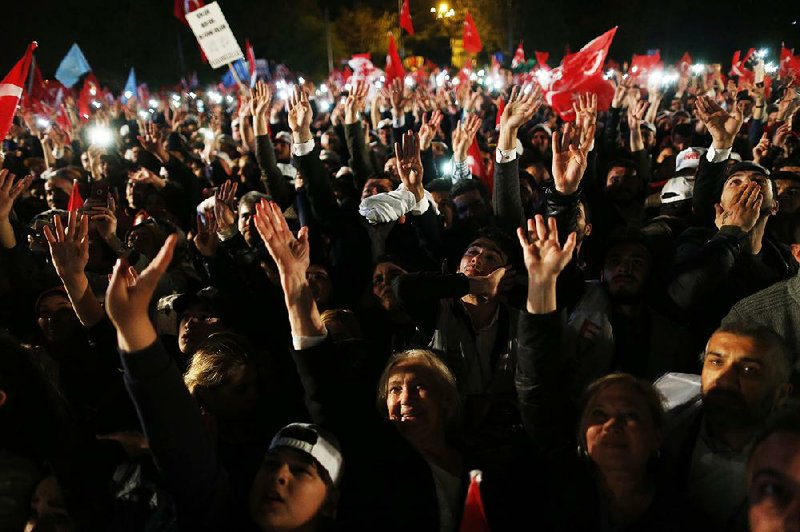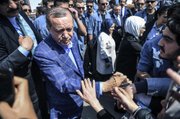ISTANBUL -- A slim majority of Turkish voters agreed on Sunday to grant sweeping powers to their president, though opposition parties questioned the outcome and said they would challenge the result.
On Sunday night, President Recep Tayyip Erdogan hailed his victory in front of a crowd of supporters in Istanbul.
"We are enacting the most important governmental reform of our history," he said.
With nearly 99 percent of votes in a referendum counted on Sunday night, supporters of the proposal had 51.3 percent of votes cast, and opponents had 48.7 percent, the country's electoral commission announced.
The result will take days to confirm, and the main opposition party said it would demand a recount of about 37 percent of ballot boxes, containing around 2.5 million votes.
Before his victory was announced, Erdogan thanked all voters, no matter how they cast their ballots, and called the referendum a "historic decision."
"April 16 is the victory of all who said 'yes' or 'no,' of the whole 80 million [who live in Turkey]," Erdogan told reporters in an address that was televised live.
But he also promised to work to reinstate the death penalty -- which would end any hopes that Turkey will join the European Union -- and mocked his opponents' intent to appeal the referendum result.
"There are those who are belittling the result. They shouldn't try, it will be in vain," he said. "It's too late now."
The "yes" vote in the referendum is a validation of the current leadership style of Erdogan, who has been acting as head of government since his election in 2014 despite having no constitutional right to wield such power. The office of Turkey's president was meant to be an impartial role, largely ceremonial without full executive authority.
The result tightens Erdogan's grip on the country, which is one of the leading external actors in the Syrian civil war, a major way station along the migration routes to Europe and a crucial Middle Eastern partner of the United States and Russia.
The opposition questioned the legitimacy of the referendum after the election board decided Sunday afternoon to accept as valid those ballots that did not bear an official stamp -- a decision that increases the burden of proof for accusations of ballot-box stuffing.
"The Supreme Electoral Board changed rules mid-game, after the ballot envelopes were opened, in a way contrary to laws," said Kemal Kilicdaroglu, head of the main opposition People's Republican Party.
But Sadi Guven, head of the electoral board, defended the decision.
"There is no question of changing the rules in the middle of the game," he said.
The pro-Kurdish Peoples' Democratic Party, which also opposed the constitutional changes, said it plans to object to two-thirds of the ballots.
Hundreds of election observers were barred from monitoring the vote, and thousands of Kurds displaced by fighting in southeastern Turkey may not have been able to vote because they have no address, according to the Independent Election Monitoring Network, a Turkish agency.
More than 55 million people in the country were registered to vote, while another 1.3 million Turks cast ballots abroad. The ballots themselves did not include the referendum question -- it was assumed to be understood.
Many analysts were surprised by the close result, saying they had expected Erdogan to achieve a larger majority. Supporters of the "no" vote have complained of intimidation, including beatings, detentions and threats.
"This is a little bit bittersweet," said Cuneyt Deniz, an Erdogan supporter celebrating in Ankara. "We were expecting above 60 percent."
The result revealed a deeply divided country.
"I am incredibly sad right now," said Yesim Kara, 37, a "no" voter in Istanbul. "Dark days are ahead."
Assuming control
The 18 constitutional amendments will go into effect after the next election, scheduled for 2019. They will allow the winner of each presidential election to assume full control of the government, ending the current parliamentary political system.
The new system will also:
• Abolish the post of prime minister and transfer executive power to the president.
• Allow the president to issue decrees and appoint many judges and officials responsible for scrutinizing his decisions.
• Limit the president to two five-year terms, but give the option of running for a third term if Parliament truncates the second one by calling for early elections.
The amendments also could allow the president to order disciplinary inquiries into any of Turkey's 3.5 million civil servants, according to an analysis by the head of the Turkish Bar Association.
The victorious "yes" camp argues that a strong, centralized government will make Turkey better able to tackle its many challenges, including a troubled economy, the world's largest population of Syrian refugees, terrorist attacks, a conflict against Kurdish insurgents and the Syrian war across Turkey's southern border.
"A new page opens in our history of democracy with this vote," Prime Minister Binali Yildirim, an Erdogan loyalist, said in a victory speech Sunday night. "Be sure, everyone, we will use this result as best as we can -- for the wealth and peace of our people."
Erdogan's supporters deny that the new system will limit political and judicial oversight. If opposition parties win control of Parliament, they could override the president's decrees with their own legislation while also asserting greater control over judicial appointments, supporters of the amendments contend.
But opponents fear the changes will lead to autocratic rule, ensuring that the 63-year-old Erdogan, who has been accused of repressing rights and freedoms, could run for office in 2019 and govern until 2029 with few checks and balances.
Eager voters lined up at one Istanbul polling station before it opened at 8 a.m.
"I don't want to get on a bus with no brake system. A one-man system is like that," said Husnu Yahsi, 61, who added that he voted "no."
In another Istanbul neighborhood, a "yes" voter expressed full support for the president.
"Yes, yes, yes! Our leader is the gift of God to us," said Mualla Sengul. "We will always support him. He's governing so well."
Rising status
Erdogan, a onetime mayor of Istanbul, came to power in 2003 as prime minister and served in that role until becoming Turkey's first directly elected president in 2014.
The changes supported Sunday help to cement, in the minds of many in Turkey, Erdogan's status as the most consequential leader since Mustafa Kemal Ataturk, the founder of the Turkish Republic.
His supporters have included his core constituency of conservative Muslims. He also successfully courted members of a Turkish nationalist party, who helped propel the constitutional amendments through the parliament.
But he also became feared and hated by many who saw him as seeking to erode the country's secular traditions by imposing his conservative, religious views.
Erdogan served three consecutive terms as prime minister as head of his Islamic-rooted Justice and Development Party, before becoming Turkey's first directly elected president in 2014.
Supporters found in him a man who gave a voice to the working- and middle-class religious Turks who long had felt marginalized by the country's Western-leaning elite. He was seen to have ushered in a period of stability and economic prosperity, building roads, schools, hospitals and airports in previously neglected areas.
"He's a real leadership figure because he is not a politician that comes from the outside. He comes from the street," said Birol Akgun, an international relations expert at Ankara's Yildirim Beyazit University. "He has 40 years of political experience and is very strong in practical terms."
But with each election win, Erdogan grew more powerful and, his critics say, more authoritarian. Erdogan has lashed out at his opponents, accusing them of endangering the country and even supporting terrorism.
Since a failed coup attempt in July, Turkey has been under a state of emergency. Erdogan has also launched a wide-ranging crackdown on followers of his former ally, Islamic cleric Fethullah Gulen. Erdogan blames Gulen, who lives in the United States, and his supporters for plotting the coup -- an allegation Gulen has denied.
The crackdown led roughly 100,000 people to lose their jobs, including judges, lawyers, teachers, journalists, military officers and police. More than 40,000 people have been arrested and jailed, including pro-Kurdish lawmakers.
Hundreds of nongovernmental organizations and news outlets have been shut down, as have many businesses, including schools and fertility clinics.
Erdogan has also criticized European countries, accusing authorities in the Netherlands and Germany of being Nazis for refusing to allow Turkish ministers to campaign for Sunday's referendum among expatriate voters.
"One person will determine national security policies, according to the constitutional changes. Why one person? What if he makes a mistake? What if he is deceived? What if he is bought?" Kilicdaroglu, head of the People's Republican Party, said during a "no" rally in Ankara on Saturday.
"Surrendering the Republic of Turkey to one person is a heavy sin. It's very heavy," Kilicdaroglu added. "Can there be a state without rights and justice?"
Information for this article was contributed by Patrick Kingsley of The New York Times; by Elena Becatoros, Suzan Fraser, Zeynep Bilginsoy, Bram Janssen and Mucahit Ceylan of The Associated Press; and by Kareem Fahim of The Washington Post.
A Section on 04/17/2017

